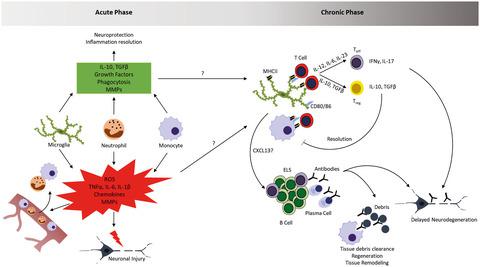当前位置:
X-MOL 学术
›
Brain Pathol.
›
论文详情
Our official English website, www.x-mol.net, welcomes your
feedback! (Note: you will need to create a separate account there.)
Interaction of microglia with infiltrating immune cells in the different phases of stroke
Brain Pathology ( IF 5.8 ) Pub Date : 2020-10-15 , DOI: 10.1111/bpa.12911 Daniel Berchtold 1 , Josef Priller 2, 3 , Christian Meisel 4 , Andreas Meisel 1, 5, 6, 7
Brain Pathology ( IF 5.8 ) Pub Date : 2020-10-15 , DOI: 10.1111/bpa.12911 Daniel Berchtold 1 , Josef Priller 2, 3 , Christian Meisel 4 , Andreas Meisel 1, 5, 6, 7
Affiliation

|
Stroke, in association with its complications, is one of the leading causes of mortality and morbidity worldwide. Cerebral ischemia triggers an inflammatory response in the brain that is controlled by the activation of resident microglia as well as the infiltration of peripheral myeloid and lymphoid cells into the brain parenchyma. This inflammation has been shown to have both beneficial and detrimental effects on stroke outcome. The focus of this review lies on the functions of myeloid cells and their interaction with infiltrating lymphocytes in different phases of stroke. A detailed and time‐specific understanding of the contribution of different immune cell subsets during the course of cerebral ischemia is crucial to specifically promote beneficial and inhibit detrimental effects of inflammation on stroke outcome.
中文翻译:

中风不同阶段小胶质细胞与浸润免疫细胞的相互作用
中风及其并发症是全世界死亡率和发病率的主要原因之一。脑缺血会触发大脑中的炎症反应,该反应由常驻小胶质细胞的激活以及外周髓细胞和淋巴细胞浸润到脑实质中控制。这种炎症已被证明对中风结果具有有益和有害的影响。本综述的重点在于髓样细胞的功能及其与卒中不同阶段浸润淋巴细胞的相互作用。对脑缺血过程中不同免疫细胞亚群的贡献的详细和时间特异性理解对于特异性促进炎症对中风结果的有益影响和抑制有害影响至关重要。
更新日期:2020-12-17
中文翻译:

中风不同阶段小胶质细胞与浸润免疫细胞的相互作用
中风及其并发症是全世界死亡率和发病率的主要原因之一。脑缺血会触发大脑中的炎症反应,该反应由常驻小胶质细胞的激活以及外周髓细胞和淋巴细胞浸润到脑实质中控制。这种炎症已被证明对中风结果具有有益和有害的影响。本综述的重点在于髓样细胞的功能及其与卒中不同阶段浸润淋巴细胞的相互作用。对脑缺血过程中不同免疫细胞亚群的贡献的详细和时间特异性理解对于特异性促进炎症对中风结果的有益影响和抑制有害影响至关重要。











































 京公网安备 11010802027423号
京公网安备 11010802027423号